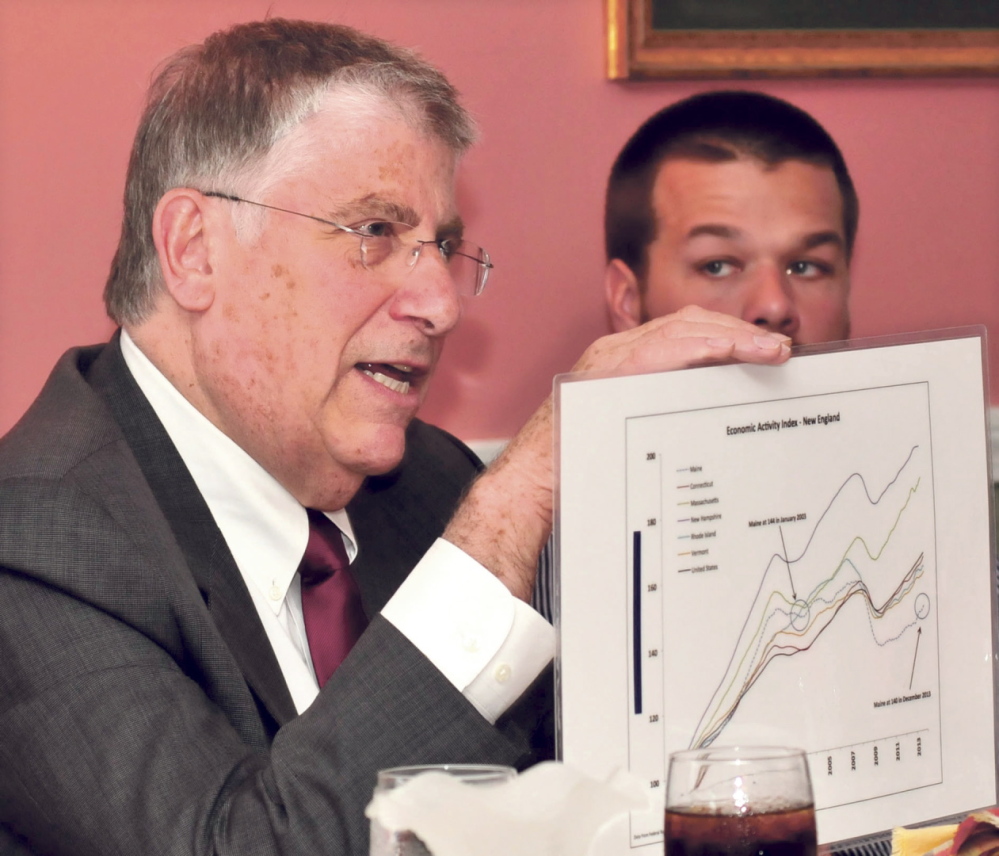SKOWHEGAN — If economic growth were a NASCAR race, Maine would be in last place.
That was the message independent candidate for governor Eliot Cutler gave Tuesday afternoon to the Skowhegan Rotary Club.
“There are people in Maine working two or three jobs just to get by who bought fuel oil this winter in 5-gallon cans because they couldn’t afford to buy more, who hunted for wood under the snow to burn in their wood stoves to keep warm. One in four of our kids are hungry, and it’s all a result of our failure to grow economic activity in the state,” Cutler said after lunch at the Heritage House on Madison Avenue.
Cutler is in a three-way race with Republican incumbent Gov. Paul LePage and U.S. Rep. Mike Michaud, D-2nd District.
Cutler’s visit Tuesday came just hours after he announced a tax reform plan in Portland that he says would save Maine property tax payers 20 percent to 40 percent on annual property taxes. The plan would involve shifting sales tax to nonresidents through changes in sales taxes.
He also visited Main Street Skowhegan, a downtown development group, on Tuesday, and plans to visit the Somerset Grist Mill on Wednesday. The mill is one example of the success that Skowhegan has had in revitalizing its economy and an example of what can be done to initiate change in other parts of the state, Cutler said. He also pointed to tomato grower Backyard Farms in Madison as an example of economic growth, despite the state having what he called an overall lack of new opportunity.
“We have to change, and you’ve really proven that it can be done here in Skowhegan. This (town) looks different today than it did four years ago. The grist mill is here. We’re going to go visit downtown later today, the tomato plant in Madison. All of these changes that have come about are changes that you and your neighbors have made happen,” Cutler said to an audience of about 20 Rotary members.
The main problems facing the state today include an aging population, incomes that are below New England and national averages and slow job growth, said Cutler. The tax plan would take advantage of one of Maine’s greatest assets — its tourism industry — to address these problems, he said.
“We have on average about 15 million people visiting the state, and they ought to share in some of the burden. We are only 1.3 million people, but we have this enormous piece of real estate we are responsible for taking care of,” Cutler said.
Rotary members asked Cutler what can be done to fix some of those things, including the problem of an aging population, and challenged the new tax plan.
“When we talk about passing on the tax burden, it always seems like it will still be felt by local people. For example, if we raise the tax on ski lifts, well, I ski too,” said Jeremy Martinez, a Rotary member and the owner of Skowhegan Press, a Parlin Street printing shop.
He said he thought Cutler’s answer — that by lifting part of the property tax burden and exporting it to visitors to create a larger number of people to share in paying taxes — made sense, although he wasn’t familiar with all the details of the newly announced plan.
The plan would either increase sales tax and lodging seasonally or expand the sales tax base slightly to include more recreation opportunities. Alternatively, sales tax could rise from 5 percent to 6 percent across the state, said Cutler. It is estimated to restore $100 billion in municipal revenue sharing to local cities and towns and $75 million to school funding when paired with an expansion of the state’s homestead exemption, he said.
“We’ve got to find a way to make the tax burden shared more equitably. Right now, under (LePage’s) policies, it’s really killing people all over the state; and we’ve got to change it,” Cutler said.
Rachel Ohm — 612-2368 rohm@centralmaine.com
Send questions/comments to the editors.




Success. Please wait for the page to reload. If the page does not reload within 5 seconds, please refresh the page.
Enter your email and password to access comments.
Hi, to comment on stories you must . This profile is in addition to your subscription and website login.
Already have a commenting profile? .
Invalid username/password.
Please check your email to confirm and complete your registration.
Only subscribers are eligible to post comments. Please subscribe or login first for digital access. Here’s why.
Use the form below to reset your password. When you've submitted your account email, we will send an email with a reset code.